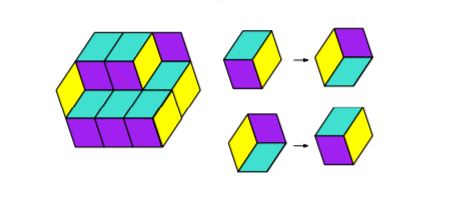Consider a Markov chain on a state-space which is slightly weird: It is the space of all tilings of a hexagon as shown in the left-hand side of the figure below with three types of rhombi: yellow, purple and cyan(a tiling means we cover the hexagon exactly with no empty space). The Markov chain picks one hexagon consisting of all three types of rhombi uniformly at random and flips it as is shown in the right-hand side of the figure. This is a finite-state Markov chain.
Show that this Markov chain is irreducible.
The question does not ask for precise mathematical expression.
My idea: W.L.O.G. the original tilings of a hexagon have three cases denoted by $\{1, 2, 3\}$ which the probability of each one is $1/3$. Then after flipping each one, we get three new tilings denoted by $4, 5, 6$ where state $4$ got from flipping the state $1$ and $5$ got from $2$, $3$ got from $6$. So there are two elements of the state space is $\{1, 2, 3, 4, 5, 6\}$.
It is clear that state $1, 4$ communicate each other by flipping the state $1$ or $4$. Similar with $2, 5$ and $3, 6$. But how to get the $2$ from the other states except for $5$
Is there any idea? Thanks!

